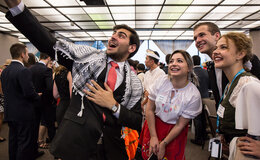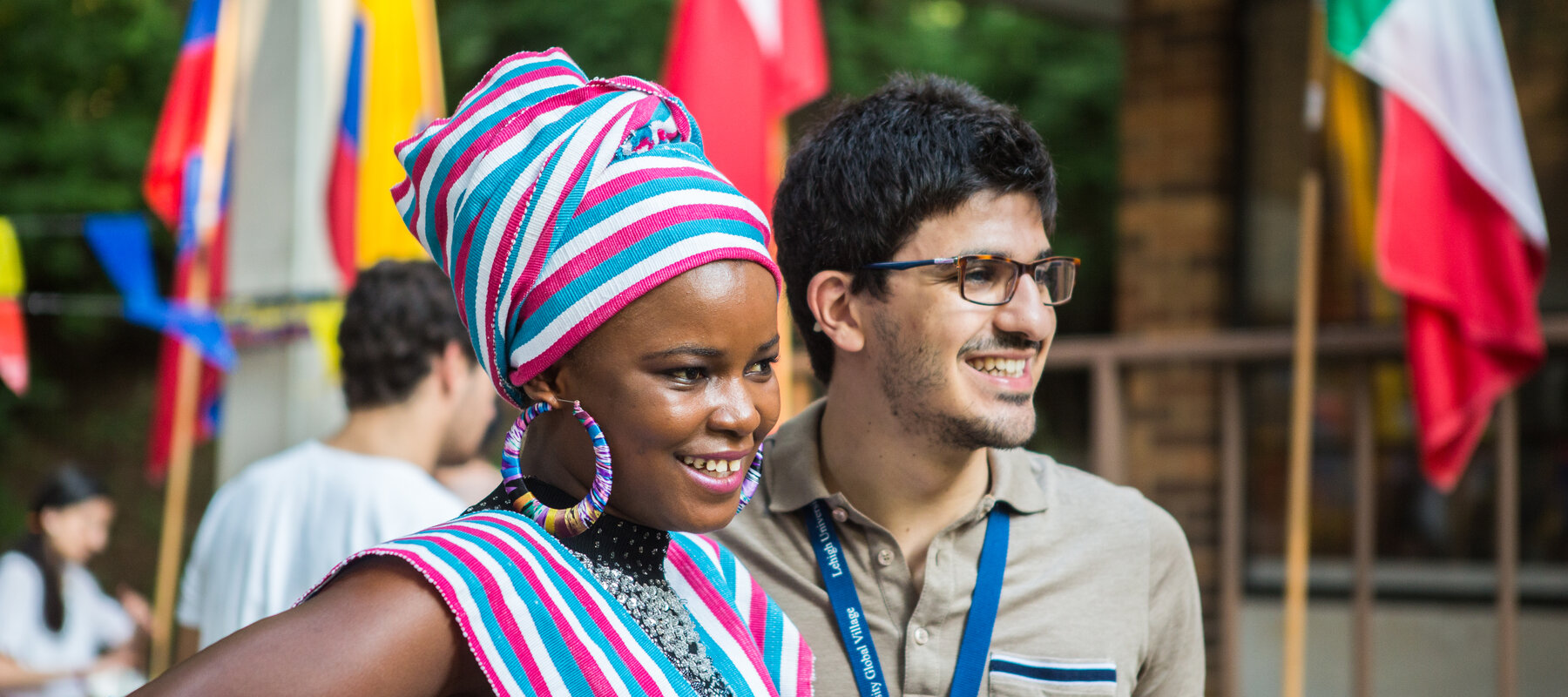The Global Village brings together university students and professionals from around the world to learn how to work across cultures and lead in a global community. Today, the Global Village alumni network includes more than 2,470 successful leaders from 141 countries.
When Basel Al-Madhoun was 21 years old he led a team that negotiated AT&T’s entrance into China. The team comprised people from six nationalities and they had to engage with an equally diverse group representing the Chinese.
It was all part of Lehigh University’s intensive summer program, Global Village for Future Leaders, which attracts young professionals and college students from around the world to hone their business, entrepreneurial and leadership skills. Top business experts mentor the Villagers who, like Al-Madhoun, a Palestinian from Gaza, learn how to live and work with people from scores of different countries and cultures.
“I was project-managing my group and I remember very well the mistakes I made,” says Al-Madhoun of the simulated U.S.-China negotiations at the 2016 Global Village. “Sometimes I was too kind because I wanted to please everyone. Sometimes I was too funny, sometimes I was too rough. These experiences provide you a safe place to fail.”
Al-Madhoun learned from his mistakes and today he is chief of staff for Qima, a coffee company focused on sustainably improving the lives and livelihoods of coffee farmers in Yemen and Colombia. He lives in London where he has been active in the World Economic Forum.
Global Village breeds a group of individuals who are a) independent thinkers and b) act on their values.
The life-changing lessons absorbed each summer at Lehigh University’s Global Village cannot be explained by a syllabus; they elude neat descriptions and defy easy encapsulation.
The Global Village was started in 1997 by the Iacocca Institute – named for the famed automotive icon, Lee Iacocca ’45. Iacocca and Roger Nagel, then the Institute’s director, envisioned a program that would draw young leaders from around the world for innovative learning experiences. Over the last 25 years, it has brought together more than 2,450 young leaders from 141 countries in North America, South America, Europe, Asia, Africa and the Middle East. It has equipped them with new mindsets of how to live and work and effect change. It has created a cross-cultural, cross-generational network of alumni that help each other in ways that would be the envy of any university alumni association.
So, for example, in 2012, Canadian Samir Rath started a company that does algorithmic optimization for wholesalers with a Peruvian and a Chilean he met at the 2011 Global Village six-week summer program. This year, when they sold the company to one of the largest private equity firms in the U.S., it had 70 employees across Mexico, Peru, Colombia, Chile and now the U.S.
“My education has been at some of the top tier-institutions globally,” says Rath, of Kitchener-Waterloo, Canada. “I have had a better relationship with the alumni of Global Village compared to all these other places, which also have fantastic alumni. The Global Village alumni have had a bigger impact on my life than the other three educational institutions combined. So for six weeks that’s an insane return on investment.”
He was echoed by Al-Madhoun, who said Village alums around the world have helped him with tasks such as obtaining trademarks and finding interpreters in their home countries.
“We have an amazing network of people, the alumni of GV,” he says. “Whenever you need something, you just post it on the Facebook group and someone will come to your rescue.”

A diverse living-learning community
Rath and other Global Village alums credit former Iacocca Institute Director Richard Brandt with emphasizing authentic leadership in business that is values-driven and not just concerned with the bottom line. Brandt ran Global Village for 17 years before retiring in the fall of 2016.
Global Village “constantly breeds a group of individuals who are A) independent thinkers and B) act on their values,” Rath says. “They are not armchair moralists or armchair virtue-signalers.”
Kira Mendez, who helped design Global Village with Nagel in the 1990s and took over for Brandt as director of the Iacocca Institute and Global Village in 2016, says inculcating such attributes are key to the program’s mission.
“We believe the future needs leaders who can cross boundaries,” Mendez says. “Leaders that can collaborate, that come across differences and operate in quickly moving, shifting environments and operate in new models and ways of thinking, and incorporate diverse relationships and viewpoints.”
Villagers, who now come for a five-week fee-based and grant-funded program, live together in the Upper Centennial residence halls and cook meals together in the dormitory kitchen. They go to on-site visits, give presentations, conduct and participate in workshops and discussions with corporate executives and Lehigh faculty and staff. Being in close quarters with scores of people of different countries, cultures and languages can be disorienting, especially the first week, Mendez says.
“I tell the Villagers on their first day that within their first week they are going to profoundly insult somebody without meaning to,” she says. “The only thing that matters is what happens after that.
“We’re really environment designers and these environments help young leaders to develop global mindsets and skill sets quickly in a very consequential way,” says Mendez. “You are in this intensive community that doesn’t exist anywhere else on Earth. Villagers learn to navigate and bridge differences in ways that they don’t see around them at home. And they realize they were given a great gift from having to struggle with this environment and the learning that came as a result.”
a chance to work as a team to solve real problems
Participants are assigned to teams of six or seven that do consulting projects for companies, nonprofits, and educational and public institutions. They sign a contract with their client and have complete autonomy on how they complete the project.
“They have to overcome all the difficulties of doing this with a team they just met, from all these different places with communication difficulties, and deliver something of value,” Mendez says. “We have served more than 130 project client organizations.”
So, for example, Rath worked on pricing and marketing strategy for a startup that was trying to make textbooks more affordable. Al-Madhoun helped with a marketing project for Lehigh’s Office of Technology Transfer.
As with other exercises and forums, the project work incorporates plenty of deliberation by the Villagers.
“It was always accompanied by vigorous debate,” Rath says. “That’s what brings out new ways of thinking.”
That ethos of encouraging participants to challenge each other and authority was eye-opening for Keti Bochorishvili of the Republic of Georgia, who attended the program in 2006. She had been an exchange student in the U.S. but says the Lehigh program transformed her into a global citizen.
“Coming from Soviet culture, asking questions was very difficult for me,” Bochorishvili says. “I truly became open-minded in terms of understanding issues from different perspectives.”
Later back home in the Georgian Republic, she served in the government as vice minister of Economy and Sustainable Development in charge of such areas as investment, private sector development, exports, tourism and special development. During that time, Georgia went through large economic reforms and in 2019 was ranked seventh by the World Bank for ease of doing business. Previous rankings had Georgia over 100th, Bochorishvili says.
“I’m happy that I was part of the reform team and was able to contribute to the economic development of Georgia,” she says. Her Global Village experience taught her how to coordinate with people from diverse backgrounds and bring out the best in them.
An opportunity to join a Global Network
The program was also life-changing for Lindsey Long ’07 who attended the summer after her first year at Lehigh. Prior to that, her travels had always been “through the protected lens of a tourist,” she says.
Global Village purposely limits its number of Lehigh students and Americans each summer as a way to keep the international diversity. For Long, the program exposed her to different ways of thinking and life paths and she became enamored with the idea of living and working abroad.
“It opened my mind to all my future possibilities,” Long says.
After graduating with an accounting degree and a minor in international economics, Long joined the accounting firm Ernst & Young and eventually did rotations in Sydney, London, Mumbai and back to London again. She returned to the U.S. in 2018 and recently made partner at the firm. All along the way, Long connected with other Global Villagers around the world.
When she first moved to London, she was about to turn 27 as a stranger to a new city so she put out a call to any Global Villagers around London who might join her to celebrate. The response was overwhelming.
“Not only did I get to meet some of the local Global Village [alumni] in London but people flew in from Switzerland, from Spain, from Germany to come celebrate and be together,” she says. “People just brought sleeping bags and slept all over my corporate housing apartment.”
As with Long, connections to other Global Villagers aren’t simply about doing business, Basel Al-Madhoun and Samir Rath say.
“Lehigh was a big turning point in my life,” Al-Madhoun says. “I am still best friends with my group of friends from Lehigh.”
The first Sunday of each month, they have a group chat, a ritual they have kept up for six years.
After years abroad, Rath moved back to Canada at the start of 2021. His closest friends are two people he met who attended the Global Village – but in different years. Rath recently became a father, and has developed a support network of new parents with his 2011 Global Village classmates.
“And these babies are growing up speaking many different languages from Hebrew to Spanish to Swedish to English and with various different kinds of contextual challenges. Having each other has been amazing for us.”
The Global Village had to take place virtually during the height of the Covid pandemic, but it was back on campus this year.
Over the last quarter century, the Global Village has enhanced Lehigh’s experience and expertise in international education and that has helped attract programs like the Mandela Washington Fellowship for Young African Leaders, a program of the U.S. Department of State. In June, Lehigh hosted 25 emerging leaders from across Sub-Saharan Africa for leadership training as one of 27 educational institutions across the U.S. to do so. It has also expanded to Global Village on the Move, which has taken its leadership training abroad.
Now part of the Office of International Affairs, the impact of the Global Village continues to reverberate as Villagers return to their countries and make a difference.
When Iacocca came to the first couple of Global Villages, he had an inkling of its future of enormous reach and value.
Mendez says: “There was this recognition for him that empowering our next leaders was really his legacy.”
